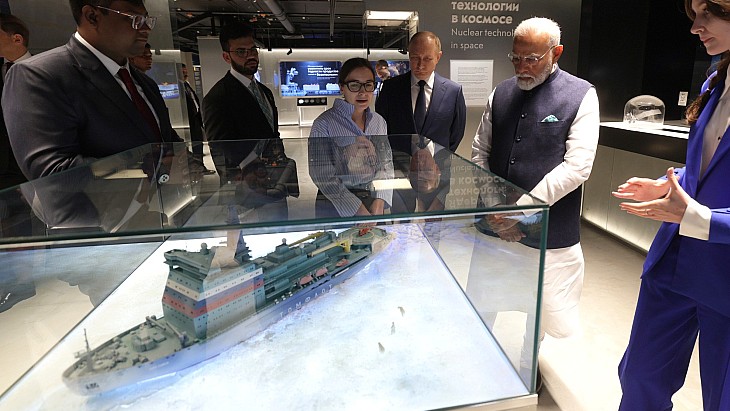During a tour of the Atom Pavilion in Moscow, the two leaders, pictured above, saw details of a range of different nuclear energy technologies and projects, including nuclear-powered ice breakers and floating nuclear power plants which, according to the Tass news agency, Putin said can eventually "replace the oil produced around the world". The news agency also reported Rosatom Director General Alexei Likhachev as having told Modi that Russia could offer small nuclear power stations to India with "very deep localisation - we can transfer the whole construction part to you".
There were also discussions about the non-energy applications of nuclear technologies including water desalination, irradiation of seeds and food products as well as the possibilities of growing the transport of goods along the Northern Sea Route, which relies on the nuclear-powered icebreakers.
The text of the leaders' joint statement
"The parties noted the importance of cooperation in the field of the use of nuclear energy for peaceful purposes as an essential component of the strategic partnership. They welcomed the progress made in the construction of the remaining power units of the Kudankulam nuclear power plant and agreed to adhere to the existing schedule, including delivery dates for equipment. Both sides emphasised the need for further discussions on the allocation of a second site in India in accordance with previously concluded agreements. The parties agreed to continue technical consultations on the implementation of the project for the construction of a new nuclear power plant of the Russian design with a VVER-1200 reactor plant, localisation of equipment and joint production of nuclear power plant components, as well as on issues of coordination of activities in third countries. The parties confirmed their intention to expand cooperation in the field of the nuclear fuel cycle, ensuring the life cycle of the Kudankulam NPP and non-energy applications of nuclear technologies."
The background
India has large-scale expansion plans for nuclear energy and earlier this year Union Minister Jitendra Singh said it planned to increase its installed nuclear generating capacity from the current 7480 MWe to 22,800 MWe by 2031-32. It has a mix of technology, including indigenous designs and others from across the world.
Kudankulam is home to two operating Russian-supplied VVER-1000 pressurised water reactors which are owned and operated by Nuclear Power Corporation of India Ltd. Four further VVERs are under construction: work started on units 3 and 4 in 2017, and on units 5 and 6 in 2021 and the plan is to complete construction by 2027. A fourth phase comprising two VVER-1200 reactors - Kudankulam 7 and 8 - has been proposed. There have also been talks about a further nuclear power plant in the country which would feature up to six Russian units, with Tass reporting that India had said in 2021 it would identify a suitable site.
What next?
According to the Tass news agency, Likhachev told the Rossiya-24 TV news channel: "We are currently developing the agenda of further cooperation. As we have tested each other and constructed very efficient relations in the present generation, the so-called 3+, we would like to move toward the fourth generation together." He said these included fast-neutron reactors, further modification and development of its VVER technology and fuel cycle closure.





_87299.jpg)
_52351.jpg)








